Tens of thousands of people took to the streets of Taipei yesterday to protest the death of army corporal Hung Chung-chiu (洪仲丘), who allegedly died from abuse while serving in the military.
Singing a Taiwanese version of the revolutionary song Do You Hear the People Sing? — one of the songs from the musical Les Miserables — white-clad protesters rallied on Ketagalan Boulevard in front of the Presidential Office, demanding that the military reveal the truth about Hung’s death and calling for the government to push for better protection of human rights in the military.
The demonstration was held on the eve of Hung’s funeral and attracted 200,000 people, according to event organizer and activist group Citizen 1985. Police estimated the crowd as numbering 110,000.
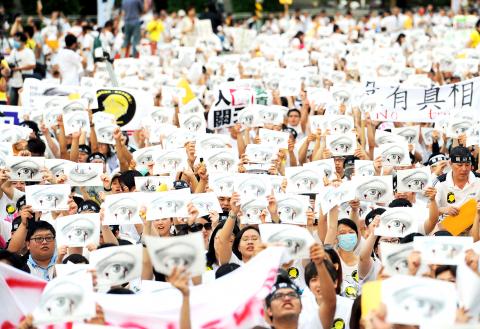
Photo: Lo Pei-der, Taipei Times
The group had previously said that it hoped “to attract 100,000 people to the rally to bid Hung farewell and push the government to investigate the case impartially.”
Among other appeals made by the demonstrators were calls for the Special Investigation Division to immediately launch a probe into the case, a review all similar cases reported in the past and the passage of legislation to allow service personnel to be tried in civilian courts in peace time rather than by court-martial.
Hung, a National Cheng Kung University graduate, died of heatstroke on July 4, following exercises he was forced to do as part of his punishment while confined to detention barracks for bringing a camera-equipped cellphone onto his base on June 28 without permission.
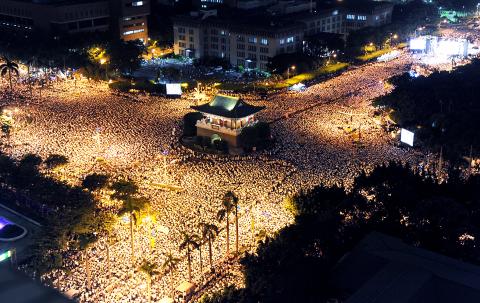
Photo: Lo Pei-der, Taipei Times
His death, just two days before he was due to be discharged after completing his year-long compulsory military service, has sparked a public outcry, with thousands of protesters holding a rally in front of the Ministry of National Defense on July 20 to demand an investigation.
Military prosecutors have found that some of the defendants held grudges against Hung and had colluded to bypass standard disciplinary procedures in order to subject him to punishment that was more severe than his offense merited.
Eighteen army officers have been indicted on charges of causing the death of a subordinate, impinging upon individual freedom or handing out unauthorized punishments.
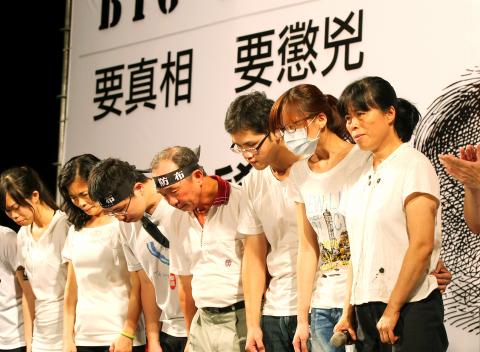
Photo: CNA
All four army personnel detained during the investigation were released on bail on Thursday and Friday, a decision by the military court that the Hung family said it would appeal.
“Thank you everyone for helping us find the truth,” Hung’s mother, in tears, told the crowd, which responded by chanting “Go, go, go” as an encouragement to the family.
“On July 3, I received a call and rushed to the hospital, where the person I saw was not my son, but a body with many medical tubes coming out of it,” she said. “July 3 was the most heart-breaking day of my life. I cannot not believe that my healthy, active son is gone forever.”
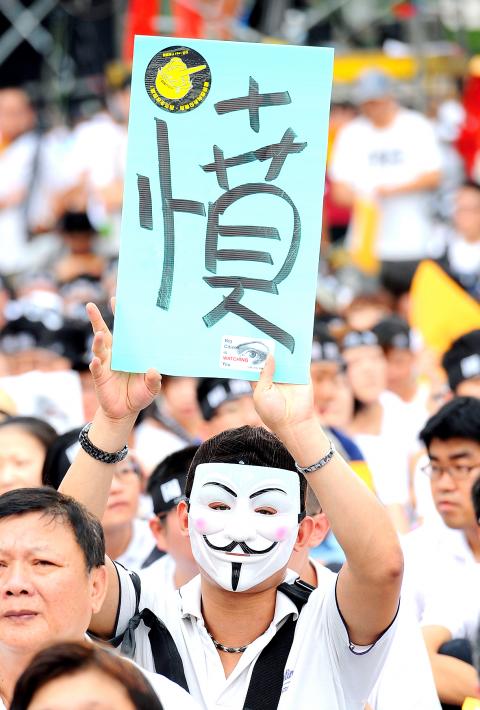
Photo: Chang Chia-ming, Taipei Times
“The military told me heatstroke was the reason for [his] death,” she said. “In the month since then, we have waited, but we have not been given the truth, honesty and justice we were promised.”
During the protest, demonstrators shouted slogans and held placards bearing messages such as “We want the truth,” “We want the perpetrators to be punished,” “We want reform” and “The president must take responsibility for human rights in the military.”
“I am mourning for Hung and I want the truth. I hope there won’t be any more abuse and deaths like his in the military,” protester Jenny Tan said.
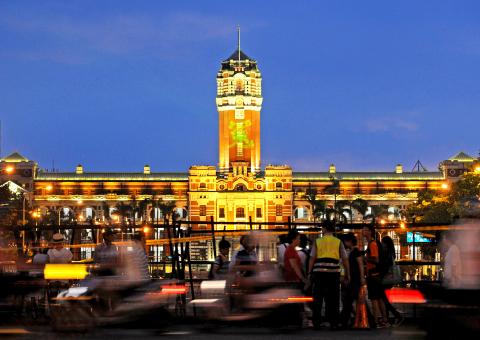
Photo: CNA
The demonstrators also projected the Chinese characters yuan (冤, “injustice” or “wronged”) and zhen xiang (真相, “truth”) on the Presidential Office with LED lights.
They also observed a 30-second silence for Hung.
The Taoyuan District Prosecutors’ Office, which on Friday said there had been no tampering with the surveillance footage of the holding cell where Hung was confined prior to his death, has said it will continue its investigation into whether a military hospital should be held accountable for document forgery and involuntary manslaughter.
The Cabinet called a press conference at 9:50pm in response to the demands.
Premier Jiang Yi-huah (江宜樺) said the Executive Yuan will establish a commission comprising officials and representatives from human rights groups and civil groups, to re-investigate possible cases of human rights abuses in the military.
The Executive Yuan will also push for the revision of the Code of Court Martial Procedure (軍事審判法) to allow cases of abuse in the military to be reviewed in civil courts in peace time rather than by court-martial.
Jiang pledged the government will spare no effort to investigate Hung’s case to uncover the truth and to thoroughly review the military disciplinary procedures.
Additional reporting by Shih Hsiu-chuan

The US government has signed defense cooperation agreements with Japan and the Philippines to boost the deterrence capabilities of countries in the first island chain, a report by the National Security Bureau (NSB) showed. The main countries on the first island chain include the two nations and Taiwan. The bureau is to present the report at a meeting of the legislature’s Foreign Affairs and National Defense Committee tomorrow. The US military has deployed Typhon missile systems to Japan’s Yamaguchi Prefecture and Zambales province in the Philippines during their joint military exercises. It has also installed NMESIS anti-ship systems in Japan’s Okinawa

‘WIN-WIN’: The Philippines, and central and eastern European countries are important potential drone cooperation partners, Minister of Foreign Affairs Lin Chia-lung said Minister of Foreign Affairs Lin Chia-lung (林佳龍) in an interview published yesterday confirmed that there are joint ventures between Taiwan and Poland in the drone industry. Lin made the remark in an exclusive interview with the Chinese-language Liberty Times (the Taipei Times’ sister paper). The government-backed Taiwan Excellence Drone International Business Opportunities Alliance and the Polish Chamber of Unmanned Systems on Wednesday last week signed a memorandum of understanding in Poland to develop a “non-China” supply chain for drones and work together on key technologies. Asked if Taiwan prioritized Poland among central and eastern European countries in drone collaboration, Lin

TRAGEDY STRIKES TAIPEI: The suspect died after falling off a building after he threw smoke grenades into Taipei Main Station and went on a killing spree in Zhongshan A 27-year-old suspect allegedly threw smoke grenades in Taipei Main Station and then proceeded to Zhongshan MRT Station in a random killing spree that resulted in the death of the suspect and two other civilians, and seven injured, including one in critical condition, as of press time last night. The suspect, identified as a man surnamed Chang Wen (張文), allegedly began the attack at Taipei Main Station, the Taipei Fire Department said, adding that it received a report at 5:24pm that smoke grenades had been thrown in the station. One man in his 50s was rushed to hospital after a cardiac arrest

ON ALERT: Taiwan’s partners would issue warnings if China attempted to use Interpol to target Taiwanese, and the global body has mechanisms to prevent it, an official said China has stationed two to four people specializing in Taiwan affairs at its embassies in several democratic countries to monitor and harass Taiwanese, actions that the host nations would not tolerate, National Security Bureau (NSB) Director-General Tsai Ming-yen (蔡明彥) said yesterday. Tsai made the comments at a meeting of the legislature’s Foreign Affairs and National Defense Committee, which asked him and Minister of National Defense Wellington Koo (顧立雄) to report on potential conflicts in the Taiwan Strait and military preparedness. Democratic Progressive Party (DPP) Legislator Michelle Lin (林楚茵) expressed concern that Beijing has posted personnel from China’s Taiwan Affairs Office to its